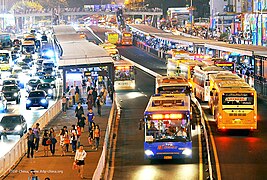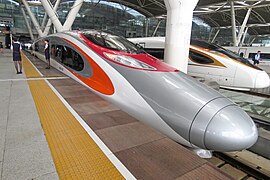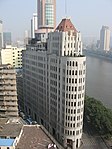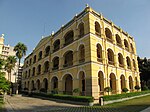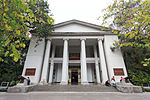
Guangzhou
Guangzhou[a] is the capital and largest city of Guangdong province in southern China.[8] Located on the Pearl River about 120 km (75 mi) north-northwest of Hong Kong and 145 km (90 mi) north of Macau, Guangzhou has a history of over 2,200 years and was a major terminus of the Silk Road.[9]
For other uses, see Guangzhou (disambiguation) or Canton.
Guangzhou
广州Canton; Kwangchow
China
214 BC
7,434.4 km2 (2,870.4 sq mi)
2,256.4 km2 (871.2 sq mi)
20,144.1 km2 (7,777.7 sq mi)
21 m (69 ft)
18,676,605
2,500/km2 (6,500/sq mi)
26,940,000
12,000/km2 (31,000/sq mi)
32,623,413
1,600/km2 (4,200/sq mi)
- CN¥ 151,162
- US$ 23,436
粤A
- Canton
- Kwangchow
ㄍㄨㄤˇ ㄓㄡ
Goangjou
Kuang3-chou1
Guǎngjhou
Gwǎngjōu
Kuaon-tseu
Kong3-ziu1
gwong2 zau1
Kńg-chiu
Suì
Seuih
Suì
Suì
ㄙㄨㄟˋ
Suey
Sui4
Suèi
Swèi
Seuih
seoi6
The port of Guangzhou serves as transportation hub and Guangzhou is one of China's three largest cities.[10] For a long time it was the only Chinese port accessible to most foreign traders. Guangzhou was captured by the British during the First Opium War and no longer enjoyed a monopoly after the war; consequently it lost trade to other ports such as Hong Kong and Shanghai, but continued to serve as a major Entrepôt. Due to a high urban population and large volumes of port traffic, Guangzhou is classified as a Large-Port Megacity, the largest type of port city in the world. Following the Second Battle of Chuenpi in 1841, the Treaty of Nanking was signed between Sir Robert Peel on behalf of Queen Victoria and Lin Zexu on behalf of Emperor Xuanzong and has ceded Hong Kong to the United Kingdom on 26 January 1841 after the agreement of the Convention of Chuenpi.[11] Due to worldwide travel restrictions at the beginning of the COVID-19 pandemic, Guangzhou Baiyun International Airport, the major airport of Guangzhou, briefly became the world's busiest airport by passenger traffic in 2020.[12]
Guangzhou is at the heart of the Guangdong–Hong Kong–Macau Greater Bay Area, the most populous built-up metropolitan area in the world, which extends into the neighboring cities of Foshan, Dongguan, Zhongshan, Shenzhen and part of Jiangmen, Huizhou, Zhuhai and Macau, forming the largest urban agglomeration on Earth with approximately 65,594,622 residents[13] and part of the Pearl River Delta Economic Zone. Administratively, the city holds subprovincial status[14] and is one of China's nine National Central Cities.[15] In the late 1990s and early 2000s, nationals of sub-Saharan Africa who had initially settled in the Middle East and Southeast Asia moved in unprecedented numbers to Guangzhou in response to the 1997/98 Asian financial crisis.[16] The domestic migrant population from other provinces of China in Guangzhou was 40% of the city's total population in 2008. Guangzhou has one of the most expensive real estate markets in China.[17] As of the 2020 census, the registered population of the city's expansive administrative area was 18,676,605 individuals (up 47 percent from the previous census in 2010), of whom 16,492,590 lived in 9 urban districts (all but Conghua and Zengcheng).[2] Guangzhou is the fifth most populous city by urban resident population in China after Shanghai, Beijing, Shenzhen and Chongqing.[18]
In modern commerce, Guangzhou is best known for its annual Canton Fair, the oldest and largest trade fair in China.[19] For three consecutive years (2013–2015), Forbes ranked Guangzhou as the best commercial city in mainland China.[20] Guangzhou is highly ranked as an Alpha (global first-tier) city together with San Francisco and Stockholm.[21] It is a major Asia-Pacific finance hub, ranking 21st globally in the 2020 Global Financial Centres Index.[22] As an important international city, Guangzhou has hosted numerous international and national sporting events, the most notable being the 2010 Asian Games, the 2010 Asian Para Games, and the 2019 FIBA Basketball World Cup. The city hosts 65 foreign representatives, making it the major city hosting the third most foreign representatives in China, after Beijing and Shanghai.[23][24] As of 2020, Guangzhou ranks 10th in the world and 5th in China—after Beijing, Shanghai, Hong Kong and Shenzhen—for the number of billionaire residents by the Hurun Global Rich List.[25]
Guangzhou is a major Asia-Pacific research and development hub with a high level of scientific research output, ranking 8th globally and 4th in the Asia-Pacific,[26] and is home to many of China's most prestigious universities, including Sun Yat-sen University, South China University of Technology, Jinan University, South China Normal University, South China Agricultural University, Guangzhou University, Southern Medical University, Guangdong University of Technology, Guangzhou Medical University, and Guangzhou University of Chinese Medicine.[27][28][29]
The 11,468 seat Guangzhou Gymnasium was a 2019 FIBA Basketball World Cup venue.[198]
From November 12 to 27, 2010, Guangzhou hosted the 16th Asian Games. The same year, it hosted the first Asian Para Games from December 12 to 19. Combined, these were the major sporting events the city ever hosted.[199]
Guangzhou also hosted the following major sporting events:
Current professional sports clubs based in Guangzhou include:
In the 2010s, Guangzhou became a Chinese soccer powerhouse, having won eight national titles between 2011 and 2019. The team has also won the AFC Champions League in 2013 and 2015. The club has competed at the 2013 and 2015 FIFA Club World Cup, where it lost 3–0 in the semifinal stage to the 2012–13 UEFA Champions League winners FC Bayern Munich and the 2014–15 UEFA Champions League winners FC Barcelona, respectively.[200]
Restaurants[edit]
In the 1990s the local press prolifically published reviews of restaurants in Guangzhou. The local newspapers introduced lifestyle pages and relied on infotainment to encourage the purchase of a daily newspaper.[201]
Media[edit]
Guangzhou has two local radio stations: the provincial Radio Guangdong and the municipal Radio Guangzhou. Together they broadcast in more than a dozen channels. The primary language of both stations is Cantonese. Traditionally only one channel of Radio Guangdong is dedicated to Mandarin Chinese. However, in recent years there has been an increase in Mandarin programs on most Cantonese channels. Radio stations from cities around Guangzhou mainly broadcast in Cantonese and can be received in different parts of the city, depending on the radio stations' locations and transmission power. The Beijing-based China National Radio also broadcasts Mandarin programs in the city. Radio Guangdong has a 30-minute weekly English programs, Guangdong Today, which is broadcast globally through the World Radio Network. Daily English news programs are also broadcast by Radio Guangdong.
Guangzhou has some of the most notable Chinese-language newspapers and magazines in mainland China, most of which are published by three major newspaper groups in the city, the Guangzhou Daily Press Group, Nanfang Press Corporation, and the Yangcheng Evening News Group. The two leading newspapers of the city are Guangzhou Daily and Southern Metropolis Daily. The former, with a circulation of 1.8 million, has been China's most successful newspaper for 14 years in terms of advertising revenue, while Southern Metropolis Daily is considered one of the most liberal newspapers in mainland China. In addition to Guangzhou's Chinese-language publications, there are a few English magazines and newspapers. The most successful is That's Guangzhou, which started more than a decade ago and has since blossomed into That's PRD, producing expatriate magazines in Beijing and Shanghai as well. It also produces In the Red.
The Guangzhou Higher Education Mega Center, also known as Guangzhou University Town (广州大学城), is a large tertiary education complex located in the southeast suburbs of Guangzhou. It occupies the entirety of Xiaoguwei Island in Panyu District, covering an area of about 18 km2 (7 sq mi). The complex accommodates campuses from ten higher education institutions and can eventually accommodate up to 200,000 students, 20,000 teachers, and 50,000 staff.[204]
As of June 2023, Guangzhou hosts 84 institutions of higher education (excluding adult colleges), ranking 2nd nationwide after Beijing and 1st in South China region.[205] The city has many highly ranked educational institutions, with seven universities listed in 147 National Key Universities under the Double First-Class Construction, ranking fourth nationwide (after Beijing, Shanghai and Nanjing). Guangzhou is also an important hub for international students and it was ranked 110th globally by the QS Best Student Cities Rankings in 2023.[206]
Guangzhou is a major Asia-Pacific R&D hub, ranking 8th globally, 4th in the Asia & Oceania regions after (Beijing, Shanghai and Nanjing) and 1st in South Central China region.[207]
The Guangzhou Higher Education Mega Center's higher education campuses are as follows:
Guangzhou's other fully accredited and degree-granting universities and colleges include:
The two main comprehensive libraries are Guangzhou Library and Sun Yat-sen Library of Guangdong Province. Guangzhou Library is a public library in Guangzhou. The library has moved to a new building in Zhujiang New Town, which fully opened on June 23, 2013.[208] Sun Yat-sen Library of Guangdong Province has the largest collection of ancient books in Southern China.[209]







